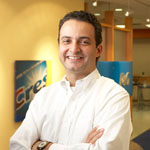By the time Ricardo Arcia was 30, he had launched three companies in his native Venezuela, including an online grocery-delivery service similar to Peapod, which serves 35,000 customers in 12 US states.
“It was a concept that was ahead of its time,” Arcia says, adding, “In Venezuela in the 1980s, the word ‘entrepreneurial,’ didn’t exist, but I always had initiative, and knew I wanted to build a business.”
Arcia continued to pursue his entrepreneurial passions; while he and his friend Enrique Fuente were both working full-time in 1998—Arcia at Verizon and Fuentes at Procter & Gamble—they founded Teravision, a company that did residential cable TV and Internet installations in Caracas. When the political situation in Venezuela forced them to close the business, they decided they were ready to launch a new venture full-time. After months of market research, Arcia and Fuentes decided on a software-development company they called Teravision Technologies.
Global Guide
Ricardo Arcia’s tips for
international expansion
Put together a good team.
Have a plan so everyone in the organization knows exactly where you’re going to go and exactly how you’re going to get there.
Establish capital, because you usually need more money than you’re expecting.
“I’ve always been interested in computers,” says Arcia, who received an undergraduate degree in electronic engineering from Simón Bolívar University in Caracas, Venezuela, and a master’s degree in telecommunications from Essex University in the United Kingdom. “You can’t understand how they work by just looking at them, and I find that fascinating.”
Teravision Technologies opened for business in Caracas in 2002. However, having learned from their previous experience, Arcia and Fuentes wanted to do business in a stable market, so the duo quickly made plans to open offices in the United States. In 2003, they began operations in Lake Mary, Florida, with a first round of capital provided by family, friends, and new partner and chief technology officer, Oswin Ondarza.
Although Teravision Technologies began as a software-consulting firm, within a few years, Arcia’s entrepreneurial spirit kicked into high gear again, and the company began selling its own aviation-related software. In 2008, it launched SomaSoftware.com, an aircraft-operation and -maintenance solution purchased by commercial, charter, and cargo airlines.
Teravision Technologies is an international company, with 45 employees in the United States, Canada, Mexico, and Venezuela—but Arcia says borders don’t matter in the traditional sense. “We sell software online, and people use it online, so we don’t have worries about importing and exporting,” he explains.
Instead, the company’s primary challenge is related to operations and marketing. “How do you customize your product for each country in which you do business?” he asks. “Each country has a tax code with different requirements, so you have to build something that a client can use in any country. Then you have the challenge of selling to disparate cultures.”
In answer to the marketing challenge, in 2010, Teravision Technologies launched HangarCentral.com, a networking site for airline-industry professionals in Latin America. “We were wondering how we’d introduce SomaSoftware.com to the broad Latin American market, so we decided to build a network that would grab the attention of the people in the industry,” Arcia says. “Today, HangarCentral.com is the leading portal for aviation professionals in Latin America, with 20,000 registered users.”
In 2007, Arcia, Fuentes, and Ondarza began developing another idea. “We’d done several consulting projects for the gaming industry, and decided to spin that work off into a separate [entity], Teravision Games, because the resources are different,” Arcia says. “The people we hire for Teravision Technologies are engineers who are focused on business processes; the people we hire for Teravision Games are engineers who are also artists and animators.”
The spin-off—run by Fuentes—was a success, and in 2012, Teravision Games merged with NDI in Canada. “Given the strengths of both companies, we should do well in the future,” says Arcia, who’s already hard at work developing his next big idea.

